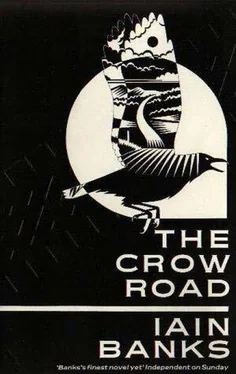Iain Banks - The Crow Road
Здесь есть возможность читать онлайн «Iain Banks - The Crow Road» весь текст электронной книги совершенно бесплатно (целиком полную версию без сокращений). В некоторых случаях можно слушать аудио, скачать через торрент в формате fb2 и присутствует краткое содержание. Год выпуска: 1992, Жанр: Современная проза, на английском языке. Описание произведения, (предисловие) а так же отзывы посетителей доступны на портале библиотеки ЛибКат.
- Название:The Crow Road
- Автор:
- Жанр:
- Год:1992
- ISBN:нет данных
- Рейтинг книги:5 / 5. Голосов: 1
-
Избранное:Добавить в избранное
- Отзывы:
-
Ваша оценка:
- 100
- 1
- 2
- 3
- 4
- 5
The Crow Road: краткое содержание, описание и аннотация
Предлагаем к чтению аннотацию, описание, краткое содержание или предисловие (зависит от того, что написал сам автор книги «The Crow Road»). Если вы не нашли необходимую информацию о книге — напишите в комментариях, мы постараемся отыскать её.
The Crow Road — читать онлайн бесплатно полную книгу (весь текст) целиком
Ниже представлен текст книги, разбитый по страницам. Система сохранения места последней прочитанной страницы, позволяет с удобством читать онлайн бесплатно книгу «The Crow Road», без необходимости каждый раз заново искать на чём Вы остановились. Поставьте закладку, и сможете в любой момент перейти на страницу, на которой закончили чтение.
Интервал:
Закладка:
CHAPTER 10
Once upon a time, long ago, there was a rich merchant who thought that the city where he lived was full of bad people, and especially bad children."
"Were they Slow Children?"
"Some of them were, as a matter of fact, but at the time they didn't have the signs to tell them so."
"Are the Slow Children only in Lochgair, dad?"
"No; there are Slow Children in various places; watch out for the road-signs. Now; back to the story. The rich merchant thought the children should always salute him and call him 'sir' when they passed him in the street. He hated beggars and old people who couldn't work any more. He hated untidiness and waste; he thought that babies who threw things from their cradles should be punished, and children who wouldn't eat their food should be starved until they ate what they had been given in the first place,"
"Dad, what if it had gone rotten?"
"Even if it had gone rotten."
"Aw, dad! Even if it had maggots and things in it and it was all horrible?"
"Yes; that would teach them, he thought."
"Awwrr! Yuk!"
"Well, the rich merchant was very powerful, and he came to control things in the city, and he made everybody do as he thought they ought to do; snowball-throwing was made illegal, and children had to eat up all their food. Leaves were forbidden to fall from the trees because they made a mess, and when the trees took no notice of this they had their leaves glued onto their branches… but that didn't work, so they were fined; every time they dropped leaves, they had twigs and then branches sawn off. And so eventually, of course, they had no twigs left, then no branches left, and in the end the trees were cut right down. The same happened with flowers and bushes too.
"Some people kept little trees in secret courtyards, and flowers in their houses, but they weren't supposed to, and if their neighbours reported them to the police the people would have their trees chopped down and the flowers taken away and they would be fined or put in prison, where they had to work very hard, rubbing out writing on bits of paper so they could be used again."
"Is this story pretend, dad?"
"Yes. It's not real; I made it up."
"Who makes up real things, dad?"
"Nobody and everybody; they make themselves up. The thing is that because the real stories just happen, they don't always tell you very much. Sometimes they do, but usually they're too… messy."
"So the rich merchant wouldn't like them?"
"That's right. In the city, nobody was allowed to tell stories. Nobody was allowed to hum, or whistle or listen to music, either, because the merchant thought that people should save their breath the way they saved their money.
"But people didn't like living the way the merchant wanted them to; most mums and dads wouldn't serve their children rotten food, and hated having to pretend that they did. People missed the trees and flowers… and having to walk around with one eye covered by an eye-patch."
"Why was that, dad? Why did they have —»
"Because the merchant thought it was a waste of light to have both eyes open; why not save the light the way you save money?"
"Were they like Mr Lachy, dad?"
"Well, not exactly, no; Lachlan Watt only has one eye; the other one looks like a real one but it's glass. The people in the city could change from one eye to the other on different days, but Lachlan —»
"Aye, dad, but they're like him sort of, aren't they?"
"Well, sort of."
"Why has Mr Lachy only got one eye, dad?"
"Uncle Fergus punched him! Eh, dad?"
"No, Prentice. Uncle Fergus didn't punch him. It was an accident. Fergus and Lachy were fighting and Fergus meant to hit Lachy but he didn't mean to put his eye out. Now; do you two want to hear this story or not?"
"Aye, dad."
"Aye, dad."
"Right. Well, the city wasn't a nice place to live because of all the silly laws the merchant had passed, and people started to leave it and go to other towns and other countries, and the merchant was spending so much time passing new laws and trying to make people obey the ones he'd already passed that his own business started to fail, and eventually the city was almost deserted, and the merchant found that he owed people much more money than he had in the bank, and even though he sold his house and everything he owned he was still broke; he was thrown out of his house and out of the city too, because he had become a beggar, and beggars weren't allowed in the city.
"So he wandered the countryside for a long time, starving and having to beg for food, and sleeping in barns and under trees, and eventually he found a little town where all the beggars and old people he'd had thrown out of the city had gone; they were very poor, of course, but by all helping each other they had more than the merchant had. He asked if he could stay with them, and eventually they agreed that he could, but only if he worked. So they gave him a special job."
"What, dad?"
"What was the job, dad?"
"He had to make brooms."
"Brooms?"
"Old fashioned brushes made from bundles of twigs tied to a wooden handle. You know up in the forest you sometimes see those things for beating out fires?"
"The big flappy things?"
"Yes; they're big bits of rubber — old tyres — attached to wooden handles, for beating out fires on the ground. Well, in the old days, those used to be made from twigs, and even longer ago people used to use brooms like that to sweep the streets and even to sweep their houses. Not all that long ago, either; I can remember seeing a man sweeping the paths in the park in Gallanach with a broom like that, when I was older than either of you are now."
"Ah, but dad, you're ancient!"
"Ha ha ha ha!"
"That's enough. Now listen; about these brooms, right?"
"What?"
"What, dad?"
The man who had been a rich merchant, and who was now a beggar, had to make brooms for the town. He had a little hut with a stone floor, and a supply of handles and twigs. But to teach the man a lesson they had given him a supply of twigs that were old and weak; poor twigs for making brooms with.
"So, by the time he had made one broom the floor of the hut was covered in bits of twigs, and he had to use the broom he'd just made to sweep the floor of his hut clean before he could start making the next broom. But by the time he'd cleaned the floor to his satisfaction, the broom had worn right away, right down to the handle. So he had to start on another one. And the same thing happened with that broom, too. And the next, and the next; the mess made making each broom had to be cleared up with that same broom, and wore it away. So at the end of the day there was a great big pile of twigs outside the hut, but not one broom left."
"That's silly!"
"That's a waste, sure it is, dad?"
"Both. But the people had done it to teach the man a lesson."
"What lesson, dad?"
"Ah-hah. You'll have to work that out for yourselves."
"Aw, dad!"
"Dad, I know!"
"What?" Kenneth asked Prentice.
"Not to be so damn silly!"
Kenneth laughed. He reached up and ruffled Prentice's hair in the semi-darkness; the boy's head was hanging out over the top bunk. "Well, maybe," he said.
"Dad," James said from the lower bunk. "What happened to the merchant?"
Kenneth sighed, scratched his bearded chin. "Well, some people say he died in the town, always trying to make a broom that would last; others say he just gave up and wasted away, others that he got somebody else to make the brooms and found somebody to provide better twigs, and got people to sell the brooms in other towns and cities, and hired more people to make more brooms, and built a broom-making factory, and made lots of money and had a splendid house made… And other people say he just lived quietly in the town after learning his lesson. That's a thing about stories, sometimes; they have different endings according to who you listen to, and some have sort of open endings, and some don't actually have proper endings yet."
Читать дальшеИнтервал:
Закладка:
Похожие книги на «The Crow Road»
Представляем Вашему вниманию похожие книги на «The Crow Road» списком для выбора. Мы отобрали схожую по названию и смыслу литературу в надежде предоставить читателям больше вариантов отыскать новые, интересные, ещё непрочитанные произведения.
Обсуждение, отзывы о книге «The Crow Road» и просто собственные мнения читателей. Оставьте ваши комментарии, напишите, что Вы думаете о произведении, его смысле или главных героях. Укажите что конкретно понравилось, а что нет, и почему Вы так считаете.












